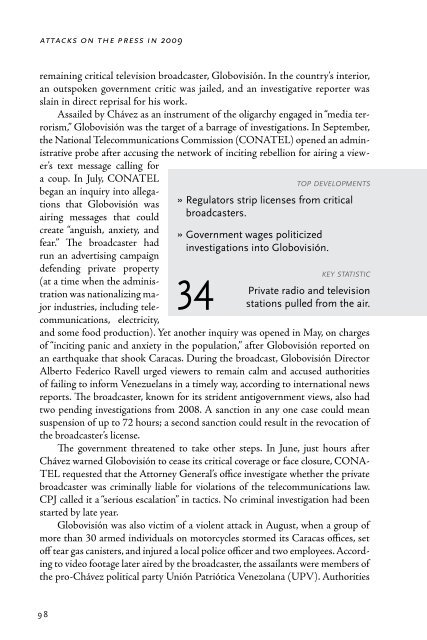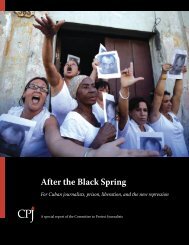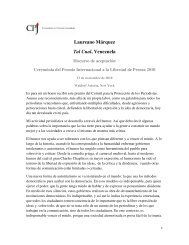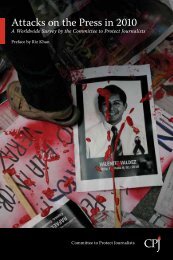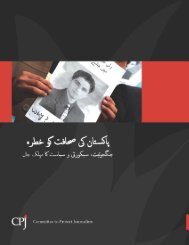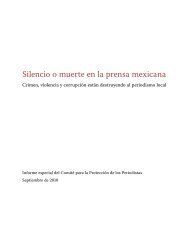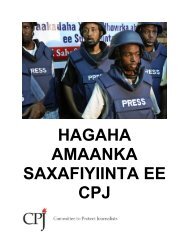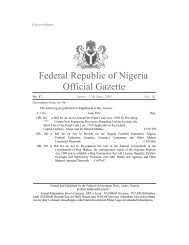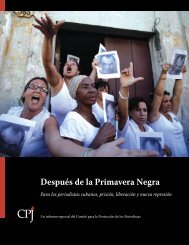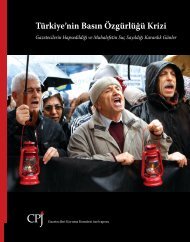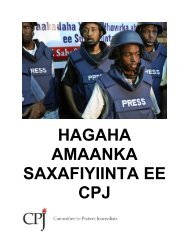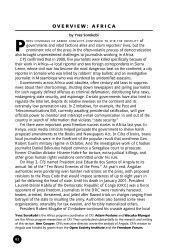Attacks on the Press - Committee to Protect Journalists
Attacks on the Press - Committee to Protect Journalists
Attacks on the Press - Committee to Protect Journalists
- No tags were found...
You also want an ePaper? Increase the reach of your titles
YUMPU automatically turns print PDFs into web optimized ePapers that Google loves.
attacks <strong>on</strong> <strong>the</strong> press in 2009americas: venezuelaremaining critical televisi<strong>on</strong> broadcaster, Globovisión. In <strong>the</strong> country’s interior,an outspoken government critic was jailed, and an investigative reporter wasslain in direct reprisal for his work.Assailed by Chávez as an instrument of <strong>the</strong> oligarchy engaged in “media terrorism,”Globovisión was <strong>the</strong> target of a barrage of investigati<strong>on</strong>s. In September,<strong>the</strong> Nati<strong>on</strong>al Telecommunicati<strong>on</strong>s Commissi<strong>on</strong> (CONATEL) opened an administrativeprobe after accusing <strong>the</strong> network of inciting rebelli<strong>on</strong> for airing a viewer’stext message calling fora coup. In July, CONATELbegan an inquiry in<strong>to</strong> allegati<strong>on</strong>sthat Globovisión wasairing messages that couldcreate “anguish, anxiety, andfear.” The broadcaster hadrun an advertising campaigndefending private property(at a time when <strong>the</strong> administrati<strong>on</strong>was nati<strong>on</strong>alizing majorindustries, including telecommunicati<strong>on</strong>s,electricity,t o p developments»»Regula<strong>to</strong>rs strip licenses from criticalbroadcasters.»»Government wages politicizedinvestigati<strong>on</strong>s in<strong>to</strong> Globovisión.key statistic34Private radio and televisi<strong>on</strong>stati<strong>on</strong>s pulled from <strong>the</strong> air.and some food producti<strong>on</strong>). Yet ano<strong>the</strong>r inquiry was opened in May, <strong>on</strong> chargesof “inciting panic and anxiety in <strong>the</strong> populati<strong>on</strong>,” after Globovisión reported <strong>on</strong>an earthquake that shook Caracas. During <strong>the</strong> broadcast, Globovisión Direc<strong>to</strong>rAlber<strong>to</strong> Federico Ravell urged viewers <strong>to</strong> remain calm and accused authoritiesof failing <strong>to</strong> inform Venezuelans in a timely way, according <strong>to</strong> internati<strong>on</strong>al newsreports. The broadcaster, known for its strident antigovernment views, also hadtwo pending investigati<strong>on</strong>s from 2008. A sancti<strong>on</strong> in any <strong>on</strong>e case could meansuspensi<strong>on</strong> of up <strong>to</strong> 72 hours; a sec<strong>on</strong>d sancti<strong>on</strong> could result in <strong>the</strong> revocati<strong>on</strong> of<strong>the</strong> broadcaster’s license.The government threatened <strong>to</strong> take o<strong>the</strong>r steps. In June, just hours afterChávez warned Globovisión <strong>to</strong> cease its critical coverage or face closure, CONA-TEL requested that <strong>the</strong> At<strong>to</strong>rney General’s office investigate whe<strong>the</strong>r <strong>the</strong> privatebroadcaster was criminally liable for violati<strong>on</strong>s of <strong>the</strong> telecommunicati<strong>on</strong>s law.CPJ called it a “serious escalati<strong>on</strong>” in tactics. No criminal investigati<strong>on</strong> had beenstarted by late year.Globovisión was also victim of a violent attack in August, when a group ofmore than 30 armed individuals <strong>on</strong> mo<strong>to</strong>rcycles s<strong>to</strong>rmed its Caracas offices, se<strong>to</strong>ff tear gas canisters, and injured a local police officer and two employees. According<strong>to</strong> video footage later aired by <strong>the</strong> broadcaster, <strong>the</strong> assailants were members of<strong>the</strong> pro-Chávez political party Unión Patriótica Venezolana (UPV). Authoritiesarrested UPV leader Lina R<strong>on</strong> days later and charged her with “c<strong>on</strong>spiring <strong>to</strong>commit a crime,” according <strong>to</strong> a statement from Minister of Interior and JusticeTarek El Aissami. R<strong>on</strong>, released in Oc<strong>to</strong>ber, was being tried in late year.CONATEL used <strong>the</strong> regulati<strong>on</strong> of broadcast licenses as pretext <strong>to</strong> silenceindependent and critical voices, pulling 32 privately owned radio stati<strong>on</strong>s and twoTV stati<strong>on</strong>s off <strong>the</strong> public airwaves in early August. The broadcasters, CONA-TEL alleged, had failed <strong>to</strong> update <strong>the</strong>ir registrati<strong>on</strong> papers by a June deadline.According <strong>to</strong> <strong>the</strong> regula<strong>to</strong>r, <strong>the</strong> stati<strong>on</strong>s were operating illegally because <strong>the</strong>ir licenseshad been granted <strong>to</strong> “natural pers<strong>on</strong>s,” while <strong>the</strong> 2000 Law <strong>on</strong> Telecommunicati<strong>on</strong>srequired <strong>the</strong>y be turned over <strong>to</strong> “legal pers<strong>on</strong>s.” The broadcasters appealed,and many presented evidence that <strong>the</strong>y had filed documents <strong>to</strong> c<strong>on</strong>form<strong>to</strong> <strong>the</strong> change. They remained off <strong>the</strong> air in late year.The regula<strong>to</strong>r had threatened earlier <strong>to</strong> revoke as many as 154 FM and 86AM radio licenses. In a July letter, CPJ urged Minister of Public Works andHousing Diosdado Cabello <strong>to</strong> ensure that broadcast licensing be c<strong>on</strong>ducted in anunbiased and transparent manner.The Chávez administrati<strong>on</strong> moved aggressively <strong>to</strong> curtail media freedom byintroducing restrictive legislati<strong>on</strong>. In July, At<strong>to</strong>rney General Luisa Ortega Díazsubmitted a bill that would punish “press crimes” with pris<strong>on</strong> terms. The goal,she said, was <strong>to</strong> c<strong>on</strong>fr<strong>on</strong>t “new forms of criminality created by <strong>the</strong> abusive exerciseof freedom of informati<strong>on</strong> and opini<strong>on</strong>.” The initiative defined “press crimes” asacti<strong>on</strong>s that threaten <strong>the</strong> “social peace, <strong>the</strong> security, and independence of <strong>the</strong> nati<strong>on</strong>,<strong>the</strong> stability of state instituti<strong>on</strong>s, mental health or public ethics, and acti<strong>on</strong>sthat cause a state of impunity.” The measure vaguely said it would “prevent andpunish acti<strong>on</strong>s or omissi<strong>on</strong>s displayed through <strong>the</strong> media that c<strong>on</strong>stitute a crime,”and would sancti<strong>on</strong> “any pers<strong>on</strong> who releases false news in <strong>the</strong> media that causesserious public disorder, fear and anxiety am<strong>on</strong>g <strong>the</strong> populati<strong>on</strong>, or damages <strong>to</strong>state instituti<strong>on</strong>s.” After an internati<strong>on</strong>al outcry, <strong>the</strong> bill was shelved by <strong>the</strong> Nati<strong>on</strong>alAssembly in August. (In January 2005, <strong>the</strong> Nati<strong>on</strong>al Assembly drasticallyincreased criminal penalties for defamati<strong>on</strong> while expanding <strong>the</strong> number of governmen<strong>to</strong>fficials protected by defamati<strong>on</strong> provisi<strong>on</strong>s.)The legislature approved an educati<strong>on</strong> bill with provisi<strong>on</strong>s prohibiting <strong>the</strong>distributi<strong>on</strong> of material that could incite “hate, aggressiveness,” “unruliness,” orcause “terror in children.” After <strong>the</strong> bill’s approval <strong>on</strong> August 13, a dozen journalistsfrom <strong>the</strong> Caracas-based dailies Ultimas Noticias, El Mundo, and RadioLíder—owned by <strong>the</strong> private media c<strong>on</strong>glomerate Cadena Capriles—stageda street protest against provisi<strong>on</strong>s <strong>the</strong>y believed hindered free expressi<strong>on</strong>. Thatsame afterno<strong>on</strong> <strong>the</strong>y were struck and kicked by people <strong>the</strong> journalists identifiedas state employees who accused <strong>the</strong>m of being “oligarchs” and “enemies of <strong>the</strong> people,”according <strong>to</strong> CPJ interviews. No <strong>on</strong>e was seriously injured, but <strong>the</strong> episode9 89 9


